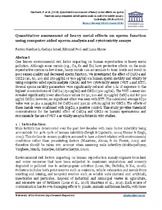Quantitative assessment of heavy metal effects on sperm function using computer‐aided sperm analysis and cytotoxicity assays
Date
2018Author
Hardneck, Farren
Israel, Gadieja
Pool, Edmund
Maree, Liana
Metadata
Show full item recordAbstract
One known environmental risk factor impacting on human reproduction is heavy metal pollution. Although some metals (e.g., Cu, Se and Zn) have protective effects on the male reproductive system in low doses, heavy metals can accumulate to toxic levels and result in poor semen quality and decreased sperm function. We investigated the effect of CuSO4 and CdCl2 (10, 50, 100 and 250 μg/ml or 500 μg/ml) on human sperm motility and vitality by using computer‐aided sperm analysis (CASA) and two cytotoxicity assays (WST‐1 and XTT). Several sperm motility parameters were significantly reduced after 5 hr of exposure to the highest concentrations of CuSO4 (250 μg/ml) and CdCl2 (500 μg/ml). The WST‐1 assay also revealed significantly lower absorbance values for 50, 100 and 250 μg/ml CuSO4 and for 500 μg/ml CdCl2; however, no significant effect was seen with XTT. The calculated average IC50 value was 50.31± 4.34 μg/ml for CuSO4 and 392.32 ±76.79 μg/ml for CdCl2. The effects of these metals were confirmed with MgCl2, a positive control. This study provides threshold concentrations for the harmful effect of CuSO4 and CdCl2 on human spermatozoa and recommends the use of WST‐1 as vitality assay in future in vitro studies.

